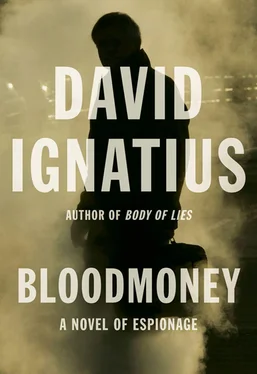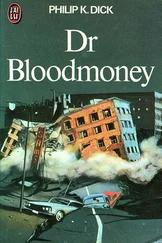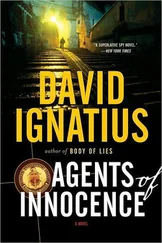David Ignatius - Bloodmoney
Здесь есть возможность читать онлайн «David Ignatius - Bloodmoney» весь текст электронной книги совершенно бесплатно (целиком полную версию без сокращений). В некоторых случаях можно слушать аудио, скачать через торрент в формате fb2 и присутствует краткое содержание. Жанр: Шпионский детектив, на английском языке. Описание произведения, (предисловие) а так же отзывы посетителей доступны на портале библиотеки ЛибКат.
- Название:Bloodmoney
- Автор:
- Жанр:
- Год:неизвестен
- ISBN:нет данных
- Рейтинг книги:4 / 5. Голосов: 1
-
Избранное:Добавить в избранное
- Отзывы:
-
Ваша оценка:
- 80
- 1
- 2
- 3
- 4
- 5
Bloodmoney: краткое содержание, описание и аннотация
Предлагаем к чтению аннотацию, описание, краткое содержание или предисловие (зависит от того, что написал сам автор книги «Bloodmoney»). Если вы не нашли необходимую информацию о книге — напишите в комментариях, мы постараемся отыскать её.
Bloodmoney — читать онлайн бесплатно полную книгу (весь текст) целиком
Ниже представлен текст книги, разбитый по страницам. Система сохранения места последней прочитанной страницы, позволяет с удобством читать онлайн бесплатно книгу «Bloodmoney», без необходимости каждый раз заново искать на чём Вы остановились. Поставьте закладку, и сможете в любой момент перейти на страницу, на которой закончили чтение.
Интервал:
Закладка:
Marx went to the office, tired as she was, after a brief stop at home to shower and change. She wanted to begin querying the files to see if she could answer these questions. Jeff Gertz was away on one of his mystery trips, which made it easier. She figured that she didn’t have to ask his permission to pull the operational files, because he had already granted it.
The Hit Parade’s most sensitive information was not in the computer system, but kept in hard copy only, in a large room called “the Vault” on the ninth floor. The keeper of this archaic library was a retired military officer who had formerly worked for the National Security Agency’s military cryptology branch, known as the Central Security Service. He was a fussy man who had helped protect some of the country’s biggest secrets for several decades. He was always called “the Colonel,” even though he had retired from active duty ten years before.
Marx took the elevator to the ninth floor and walked to the colonel’s lair. The door was closed and he didn’t answer at first, perhaps hoping that the visitor would go away. She knocked again, harder, and this time the door opened and out stepped the Colonel. He was a short, balding man, little taller than Marx herself, with a florid face and a bulbous nose. His actual name was Samuel Sinkler, but people rarely used it; he preferred rank only.
“Sorry to disturb you, Colonel, but I need to look at the Pakistan operations files.”
She showed him her badge.
“Nope,” he answered. “Sorry, you can’t have them.”
“But Mr. Gertz personally authorized me to look at all files I needed to investigate the Howard Egan case.”
“He didn’t tell me that.” The Colonel had a thin smile. He liked saying no.
Marx shook her head. She was tired and didn’t like being jerked around.
“I need those files, Colonel. I can’t do my work without them.”
“That’s not my problem, miss. You could get Mr. Gertz, but he isn’t here.” He smiled again.
She pondered what to do. He obviously expected her to give up if he said no often enough.
“I’m not leaving until I see those files. Will you give me access if Steve Rossetti says it’s okay?”
“That’s a hypothetical,” said the Colonel.
She picked up a phone on the nearest desk and dialed Rossetti’s extension.
“Steve, it’s Sophie. I’m back from Dubai and I have an emergency. I need access to some files on the ninth floor and Colonel Sinkler says he needs someone’s permission. Can you come up now?”
There was a pause, while Rossetti temporized on the other end. He didn’t like making decisions.
“I really need help now, Steve,” she said. “Otherwise I’ll have to call Jeff. He won’t be pleased, but I have no choice.”
That did it. Rossetti arrived five minutes later and personally signed the necessary piece of paper for the Colonel. Neither man was happy.
“Thanks, gents,” she said breezily. The Colonel marched her back to the Vault and unlocked the steel door, while Rossetti retreated to his office.
It was cold in the stacks. The Colonel was one of those men who believed that people worked more efficiently at lower temperatures. Marx was wearing a long-sleeved blouse, but she was shivering after thirty minutes. She descended to her office and returned with a cardigan sweater, which she buttoned to the neck. It was dark among the racks and cabinets, so she asked the Colonel for a flashlight, which he grudgingly provided. He seemed to think that darkness, too, was part of good security.
Marx started with the paper records of Egan’s travels. These were more detailed than the computer records she had consulted before. They showed a total of five trips to Pakistan over the previous thirteen months. Two of those journeys had been to Karachi, two to Lahore and one to Islamabad. To see what Egan had been doing on those trips, Marx had to consult two other sets of files. The first was his personal 201 file, which recorded the active cases he had been managing, but using cryptonyms to conceal the true names of his contacts. At the time of his disappearance, he was the case officer for four agents, all of whom had the digraph “AC,” which was The Hit Parade’s notation for Pakistan, borrowed from an old CIA cryptonym.
To learn the real identities behind those code names, Marx had to consult a separate registry inside the Vault, which was locked and guarded by video surveillance. Here again, the Colonel initially said no. Marx summoned Rossetti back, and he signed another piece of paper that allowed her access.
“I hope you find something,” said Rossetti. “If this turns out to be a wild goose chase, Gertz will be pissed off.”
“I’ll worry about Jeff,” she answered. “Not your problem.”
Rossetti walked back to elevator, muttering as he went, “Get some sleep.”
The Colonel told her to turn her back while he punched the proper code into the cyber-lock. The door clicked open. She fumbled for the light switch and set to work.
Marx began matching crypts with true identities. She first found the name of the man she had interrogated in Dubai, Hamid Akbar. She knew he would be one of the four. Egan had met him four times over the thirteen months, twice in Karachi, once in Istanbul and once in Abu Dhabi. The second name was Azim Mohammed al-Darwesh, whom she assumed must be Akbar’s uncle. Egan had met him just once, four months before the kidnapping, in Abu Dhabi, on the same date as the meeting with his nephew, Akbar, who evidently had accompanied him to an initial get-acquainted meeting outside the country. This much was simply confirmation of what she already assumed.
Then came the surprises.
The third name listed was Lieutenant Colonel Hassan Chaudhary. He appeared to be a serving officer in the Pakistani military. Egan had met him three times: once in London, once in Beirut and once in Lahore. Marx ran traces on Chaudhary’s name and discovered that he served in the office of the chief of Combat Development, which was the branch of the Pakistani military that had overseen its nuclear weapons program. He was from a prominent Punjabi family, and he was the third generation to have served in the military.
The fourth name was Professor Aziz Mukhtar. He was the rector of Mohiuddin Islamic University in Azad Kashmir. Traces on the professor showed that he was a leading activist for the liberation of Kashmir from Indian control. Egan had met with him twice, both times in Dubai.
It was an unlikely mix: A banker, a tribal leader, a military officer from a great aristocratic family and a Muslim activist. Marx was confused. These might be foreign-intelligence operations, designed to gather information about Pakistan’s plans and intentions. But Marx doubted that. FI collection was still the province of the old CIA structure. This looked like something different.
Marx knocked on the Colonel’s door. He assumed she was finished for the day, and extended his hand to receive the flashlight. But she had come with a new question.
“If you please, Colonel, I would like to look at the disbursements register,” she said. “I need to see what we’ve been paying the agents whose names I’ve been pulling.”
“You can’t,” answered the security officer. The blank, unhelpful look on his face shaded toward a smile. It gave him pleasure, once more, to say those words of refusal.
“Let’s not go through this again. I can go back downstairs and get Steve Rossetti a third time, and he can come up and tell you the same thing as before. But, honestly, Colonel, that’s a waste of time. Why don’t you just say yes?”
“I can’t. It’s not possible to see those records.”
“Why the hell not?” It was a relief to be able to swear at this cranky old man, but she wasn’t expecting his answer.
Читать дальшеИнтервал:
Закладка:
Похожие книги на «Bloodmoney»
Представляем Вашему вниманию похожие книги на «Bloodmoney» списком для выбора. Мы отобрали схожую по названию и смыслу литературу в надежде предоставить читателям больше вариантов отыскать новые, интересные, ещё непрочитанные произведения.
Обсуждение, отзывы о книге «Bloodmoney» и просто собственные мнения читателей. Оставьте ваши комментарии, напишите, что Вы думаете о произведении, его смысле или главных героях. Укажите что конкретно понравилось, а что нет, и почему Вы так считаете.












